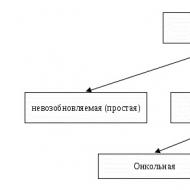
What collection agencies can do. Who are the collectors and how to avoid meeting them. What kind of collectors paint the entrances and beat the debtors
Maxim Demchenko
Font A A
The activities of collection agencies are regulated by Federal Law No. 230 "On the Protection of Rights and Legal Interests individuals when carrying out activities to recover debts. " Knowledge of the law and up-to-date information about common methods of work of claimants will help borrowers to successfully resist collectors and not succumb to their provocations.
Collection agency is an organization that implements a set of measures and actions aimed at debt recovery. A collector is an intermediary between a banking organization and a client. Loan debt collection takes place in three stages.
Soft-collection
The collector informs the client that he needs to pay the overdue debt without meeting with him. He can call back, send an SMS notification, inform about it via e-mail or social networks.
Hard-collection
The collector is in direct contact with the debtor, coming to him at the address of residence or registration. Notifications, notifications can be delivered by mail. The claimant establishes the reason for the delay, seeks, together with the borrower, solutions to the problem.
Legal-collection
The final stage. The collector transfers the case to the court, where the further fate of the debtor will be determined.
Collector types
There are two types of collection agencies, depending on the specifics of working with the debtor.
Debt Buyers
Banks can turn to collectors and sell the borrower's debt. In this case, the borrower, on the same terms, must return the money to the collector, and not to the bank.
Not redeeming debts
This category includes collection agencies, to which the creditor applies, as well as specialized departments of the bank for debt collection. The bank's collector is working on a joint search for solutions to the problem.
Legal basis for the activities of collection agencies
Federal Law No. 230 "On the protection of the rights and legitimate interests of individuals in the implementation of activities to recover debts" was adopted on 03.07.2016 by the President of Russia. The legislative act regulates the features of regulation and description of actions associated with the threat of violation of the rights of customers who are late in payments on a loan. The duties of the collectors and the sequence of the return procedure are established Money with the most favorable conditions for each of the parties.
the federal law No. 230 consists of 22 articles regulating the rules for the work of the collector, establishes the rights and responsibility for violations.
Collectors' rights in accordance with applicable law
Lenders use the services of a third-party organization (collection agency) that collects debts. Collectors must fully comply with the requirements established by the current legislation. FZ-230 regulates the following rights:
- providing accurate and truthful information about the presence of debt;
- conducting individual work with borrowers regarding payment planning;
- sending text messages by email and phone;
- making calls in the number provided by law (no more than eight calls per month);
- appointment of personal meetings - once a week;
- termination of work with the debtor if he has paid off the loan debt.
Now debt collectors are not allowed to call at night.
In 2018, changes were made to FZ-230. More details about this are described in this video:
Can the debtor be sued
The collection agency can apply to the court only if the debtor has offended the honor and dignity of its employees. In other cases, only the organization that issued the loan has the right to return the unpaid debt through the court. This possibility is provided for by the provisions of Federal Law No. 395-1, namely, Articles 33 and 27. Return through the court is also allowed under Art. 388 of the Civil Code of the Russian Federation.
Fraudulent debt collection schemes
As a rule, it is very problematic to agree with debtors on the return of money. To increase the effectiveness of events, collection agencies may resort to dishonest methods, using long-established schemes.
Black collectors - who is this
Black collectors are small organizations, which usually number less than 10 people, most of whom are former representatives of the security forces. Banks turn to them for help if the client has a large debt, which can be collected in a legal way does not work. They are called "black" because they can resort to the most severe illegal measures.
Prohibited Fraud Tricks - How Debt Collectors Break the Law
Very often, debtors complain about the violation of their rights provided for by law. For example, agency employees resort to the following illegal actions:
- Threatening to use force or physically. This is prohibited by FZ-230.
- Harm debtors. It can be physical, psychological, career (when the employer receives false information about his employee), property.
- Damage or destroy private property. For example, they puncture the wheels of a car, break windows in an apartment.
- They exert psychological pressure - they threaten with violence and other negative consequences.
- They call at night. In the period from 22:00 to 8:00, calls on debt repayment issues are prohibited by law.
- Too often. It is prohibited to visit the debtor more than once a week.
- Mislead the client or those around him. For example, they say that the debtor has already been sued, that it can end very badly, and so on.

If the collectors violate the law, the borrower has the right to go to court.
How a debtor can protect himself
On the one hand, communication with collectors creates fear. But if a person understands the norms of the law and is guided by his own rights, he can easily defend his interests.
Basic rules for communicating with collectors
When the collector calls, it is important to switch to the "indifference mode", to conduct a dialogue calmly, not to show your excitement. Collectors tend to put pressure on the psyche - in response, clear answers should be given.
Preparing for a conversation
It is important to familiarize yourself with frequently asked questions in advance. This will make you feel more confident and easy to level the arguments of the collectors.
Require the collector to introduce himself
If he did not do this himself, you need to ask for all the information:
- the name of the collection agency;
- position held;
- grounds for making a phone call.
If you receive a refusal, you can safely hang up, warning the collector that the information will not be provided to an unknown person.
Typical response outline
Employees collection organization those responsible for conducting a dialogue with clients refer to them according to pre-prepared templates. Therefore, each question should be answered with a stereotyped short answer.
Calm explanation of the reason for the delay
It is enough to explain it just once. The collector, as a rule, is not interested in these arguments, because his main goal is to quickly receive payment in a short time. With systematic calls, it is enough to report that the reason has already been indicated, and since then nothing has changed.
Conversation recording
This is very useful because the collection agency can violate the law associated with the use of illegal measures of physical and psychological pressure.
- In a face-to-face meeting, turn on the camera on your phone or the voice recorder.
- In the case of a telephone conversation, use a dictaphone or special applications for recording calls.
If the debtor is threatened by the collector, the recording of the conversation can be used by the debtor in court as evidence.
Promise to go to court
Collectors are not interested in trial because they themselves commit violations for which they can be punished. There is no need to listen to arguments that working through the courts will lead to even more serious consequences. On the contrary, the judge records the existence of a debt, after which the client has the opportunity to reduce the fine and penalty.
What to do if threatened
When receiving threats, it is imperative to record violations. Next, you need to seek help from the local court or draw up a statement at the police station.
For violation of the rules governing the principles of interaction with debtors, the collection agency is responsible.
Who are "Anticollectors" and when to contact them
Antikollektorskaya organization provides assistance to clients faced with violations of the law by the claimant. The list of basic services includes the following:
- Individual consultation and study of case materials.
- Protection of the client's interests in court and other state or municipal institutions.
- Organization of work with a collection agency, commercial bank and an insurance company.
- Preparation of a package of necessary documents.
- Getting a grace period.
- Search for alternative options for resolving a conflict situation.
- Assistance in debt restructuring or refinancing.
Employees of the anti-collection company are well versed in the legislation, therefore they help to resolve problem situations.
International practice
In Europe and the USA, the activities of collection agencies are strictly regulated at the legislative level. Each such company must have a license - this is not always the case with us. Russian collectors can disguise themselves as companies that legally have nothing to do with the services provided. For violations related to psychological and physical pressure on the borrower, in America and Europe, you will have to answer toughly - pay a large fine or go to jail (applies to both managers and the executors of the order).
Real experience of debtors
Here are some reviews about collectors from borrowers on the Internet:
Alexander, Moscow
My debt was 12 thousand rubles - I could not pay on time, because I was treated for 3 months after a fracture of the pelvis. Nobody wanted to pay attention to my condition - they called me almost every day. I had to borrow money from friends so that these extortionists would not bother me anymore.
Igor, St. Petersburg
With every call I just laughed. Whatever pretexts they came up with - they said that I would be fired from my job, put in prison for 5 years, and take away my apartment and car. Once my patience ran out - I said that if they continue to threaten, I will go to court, transferring all the telephone records of the calls. Now they seem to have calmed down.
Alesya, Yekaterinburg
These collectors are constantly threatening, hinting at violence, threatening to ruin my life if I do not pay the debt. And they are not even embarrassed by the fact that after a month of delay I made payments 3 times in 3 weeks. I don’t know anymore to go to lawyers.
The best way to avoid dealing with collectors is to make your loan payments on time. If this is not possible, you can use legal methods to solve the problem. Among them - debt restructuring and appeal to anti-collectors.
You make payments on a loan with long delays or stopped paying altogether. You probably have good reasons for this. But the bank is not always ready to take them into account, so soon you risk being face to face with a professional debt collector. the site will tell you who the collectors are and give their recommendations on how to build communication with them.
Who are the collectors
A certain stereotypical fear of collectors is largely associated with the memory of the dashing 90s, when an iron and a soldering iron were popular methods of knocking out debt.
Those times seemed to have sunk into oblivion. Today's collectors are not bandits from the high road, but employees of reputable agencies with sonorous names. They emphasize in every possible way that they work exclusively within the framework of the current legislation. Professional associations and even the "Honest Collector Code" have been created. But not everything is so blissful. The goals of the collectors remain the same: everyone possible ways and in the shortest possible time "shake out" the money from the debtor.
Unfortunately, the absence of a law on collection activities makes it possible to apply not only civilized methods of debt recovery, but also techniques on the verge of a foul - intimidation, threats, blackmail, and interference in private life.
Most borrowers have no idea how and on what principles collection agencies work, how legitimate their activities are, what they teach their employees, what they can go for. Meanwhile, it is possible and necessary to negotiate with honest collectors, and it is possible and necessary to find justice for "bouncers" - the so-called "black collectors".
A collection agency is a commercial structure (usually LLC or CJSC), whose business is the provision of paid services for the collection of overdue debts, as well as the purchase of "debt portfolios". No collection agency has the rights of the prosecutor's office or the court.
What collectors are entitled to
First, let's take a look at the collector rights. From a legal point of view, debt collectors have exactly two such rights:
- Notify the debtor about the presence of overdue debt and its size (including penalties and fines).
- Submit a lawsuit - if the bank authorized them to do this (on the basis of an agency agreement), or completely transferred the rights to overdue debt (in other words, sold your debt).
But in fairness, we note that there are very few direct legislative prohibitions and restrictions on the actions of debt collectors. Therefore, the borrower's main weapon is knowledge of their own rights. What are they?
- The civil legal relationship between you and the collector is based on the assignment of claims. According to part 1 of article 385 Civil Code, the debtor has the right not to fulfill the obligation to the new creditor until evidence of the transfer of the claim to this person is presented to him.
- There is a deadline for reclaiming overdue debt on loans limitation period- three years. If it expired before the collectors came into contact with you, their claims are null and void.
- You should pay off your debt only to the creditor bank, and there you will also receive documents confirming each payment made. Even if your debt "ends up" passed to a third party, payments should be made through a bank. In no case do not give cash into the hands of collectors, no matter who they appear to be!
- You are not obliged to sell your property at the request of the collector to pay off the debt, and the collectors are not allowed to seize your belongings. Such a procedure is possible only by a court decision, and is carried out only by bailiffs.
- You have the right not to answer the phone calls of the collectors and not open the door for them.
Until now, the federal law regulating collection activities has not been adopted - there is only a draft law "On activities to collect overdue debts", which is being developed by the Ministry of Economic Development of the Russian Federation. July 2, 2012 at the plenum The Supreme Court Russia adopted a resolution "On the consideration of civil cases by courts in disputes on the protection of consumer rights." It says that a credit institution cannot transfer the right to claim loans from citizens to persons without a banking license, if the borrower did not agree to this when signing the agreement. De facto, most banks have long prudently included in the loan agreement a clause on the possibility of transferring overdue debt to third parties - now all banks, without exception, will do this.
How to communicate with a debt agent
First, and perhaps most importantly, stay calm. If your knees buckle with fear, sit down. Take a few deep breaths: it will feel better, your voice will sound more confident. Get into a comfortable position. Place a pen or notebook in front of you. You are now ready to talk.
First of all, ask the employee who is calling you to fully introduce himself (often, representatives of collection agencies provide only the name and patronymic, without the surname), name the position. Also write down the contact details of the agency. After that, you can safely hang up: you have done enough for the first conversation.
Be sure to call back on the phone that you were given, check the information provided.
The next call is to the bank. Ask to confirm that your debt has been transferred for collection to these particular collectors. Now attention: at this stage, you have a chance to rectify the situation. Describe your financial situation to the bank, the reasons for delinquencies, ask to restructure the debt. Often banks go to an agreement: they sign a new agreement with you and provide installments from three to six months. After signing the restructuring agreement, the bank recalls your case from the collection agency.
If this move worked, with the next calls from the collectors, calmly explain that you have reached an agreement with the bank. You can ignore the threatening sms-ki like "Pay the debt, otherwise the court".
In an unfavorable scenario (the bank refused an agreement with you, or informed that all rights to your debt now belong entirely to a third party), communication with collectors, alas, will continue. Remain cool when negotiating further. Do not dispute the debt, it is useless. But do not rush to share confidential information, including the presence of property or a bank account. Do not disclose information about close relatives, do not answer personal questions ("Your wife's name is Katerina, isn't she?"). Do not be rude in return - calmly ask them to return to the discussion of the debt and how to pay it off.
Don't beg for a delay - the pressure will only increase on you. Instead, referring to Articles 385 and 389 of the Civil Code, ask for a full package of documents confirming the rights of the new creditor and his powers - in particular, a copy of the agency agreement, a copy of the assignment agreement, a power of attorney issued to a specialist who is negotiating and has access to your personal data, etc.
As a result, you, firstly, will gain time, which is so important for the debtor, and secondly, you will demonstrate your legal literacy and ability to resist psychological pressure.
In further conversations, put the problem at the center of the discussion: you have a debt, you do not dispute it, you intend to return it, but you are in a difficult financial situation. Collection agencies employ lawyers who, in the same way as bank employees, can offer you both an installment plan and a competent debt repayment scheme.
How to deal with them if you are threatened
Unfortunately, it is not always possible to build a dialogue with collectors in a civilized manner. Therefore, it should not be discounted that overzealous debt collectors will begin to shower you with insults or threats.
Threats and insults from the collectors are a violation of the law and entail administrative and criminal liability.
If you are being threatened, first of all try to record the fact of direct threats (for example, by recording a telephone conversation on a dictaphone). Then write a statement to the police. They are obliged to accept it and begin verification in order to establish the identity of the attackers. Please note that the transfer of the recording device to the investigator must be formalized by an act of seizure, and the recording itself cannot be converted to another format.
If it was not possible to make a record, write a statement anyway: the police will collect evidence, including on the basis of witness testimony. You can send a copy of the application to the collection agency.
But usually, even the message that the conversation will be recorded is enough to stop the threats. Knowledge of the relevant articles of the criminal code will also help: for example, an insult falls under Article 130, a threat of physical violence - under Article 119, and a demand to sell your property or give cash - under Article 169 (extortion).
Anti-collectors - who are they?
As you know, there is no reception against scrap ... if there is no other scrap. In the financial services market, there are not only collectors, but also anti-collectors.
Of course, these are not wizards in a blue helicopter who teach you how to run out of debt. Real anti-collectors are professional lawyers with significant experience in the pre-trial resolution of problems with outstanding debts. The coolest "bison" also has a long arbitrage practice on matters of this kind.
The least they can do is take on the negotiations with the collectors and save your nerves, as well as explain how not to do what you are being illegally forced into. But it is worth seeking legal protection in advance, as soon as you feel a threat to your solvency, and not when furniture is about to be taken out of your house ...
Instead of an epilogue
Defending one's rights and malicious evasion from fulfilling credit obligations are not the same thing.
Both the bank and the collectors have the right to demand repayment of the debt from you.
Hiding in the hope that the problem will "resolve" by itself is a very bad tactic. There is a way out even from the most difficult financial situation. For an optimal solution to the problem, it is only important to competently build a dialogue with creditors and not pay more than you actually owe.
Anastasia Ivelich, expert editor
Absolutely all banks use collection services, despite the fact that they practically do not disseminate such information. Do not believe if they are trying to assure you that the bank was not involved in hiring collectors, then you should not go for it, you will still face them if you do not pay your debts on time. Let's take a closer look at why collectors are overly intrusive, and analyze the main features of this profession.
Let's mention right away that it is best to really communicate with collectors when they start calling you. Of course, most people have a fear of these people because of the prevailing stereotype that they are simply bandits. A modern collector will simply call you, he cannot pose any threat, his task is to stimulate you to pay off the debt, he can also help you do this.
Features of the profession - why every collector is obsessive
Probably, every person who has come across collectors at least once in his life has the impression that people of this profession are incredibly intrusive and it can be extremely difficult to hide from them. This fact is also confirmed by the fact that collectors start calling even with minimal debt, for example, if you do not pay for the card service for a long time (this amount is unlikely to exceed 1000 rubles, so this behavior of collectors and banks that hired them often seems illogical).
The fact is that many debtors simply do not admit that they have their problems, instead they come up with some excuses, for example, they say that they will pay in a week and, as you might guess, repeat the same thing after 7 days.
For this reason, collectors begin to bother you several times a day, because they stop trusting you, since you have already lied about the timing. In such situations, collectors simply seek to find out what the problem really is and what the real timing of the possible receipt of payment is (obsessive behavior really very often contributes to this).
It should be understood that the collector has practically no data about you, and even more so about your current financial condition, he cannot imagine why you are not paying the debt. We advise you to always talk honestly with the collectors, but do not be fooled about the timing, otherwise you cannot avoid the considered obsession, and even with a large amount of debt, the case can quickly go to court (if you honestly explain the situation right away, then at the agreed time the collector will lag behind you). But you shouldn't imagine these people as monsters, they just do their job, and banks can be understood, because more than 5% of loans are taken in order to repay others, and another 10 percent are practically hopeless, so they are not given to everyone.
But why is the collector intrusive even with small debts? This question confuses many people, because it is really strange that the collector will not lag behind you even with a debt equal to 1000 rubles. The fact is that about 75% of debts are small, but because of their huge amount, banks' losses are large, and collectors act according to instructions, having previously received a list of all debtors.
Are errors possible
Sometimes errors appear in bank lists, as a result of which people who have previously paid off their debts may be included in the list transferred to collectors. Unfortunately, in our time this is not uncommon, and many are lost when such problems arise. There is one rule for all such situations - problems must be solved with the bank.
If during each call of the collector you try to tell him that you were on this list by mistake, then you most likely will not achieve anything, because many people lie in this way. In such situations, it is important to immediately contact the bank, where you should explain the problem to the employee in detail. Collectors always act according to strict instructions from the bank, they do not find you on their own.
The difference between collectors and bandits
As mentioned earlier, around the nineties, when such a system was just introduced, the collectors were not the same as they are now. The task of such people was not even to persuade you to pay off the debt, but to "knock" it out. They constantly threatened, used physical force, intimidated and believed that absolutely all methods were good in their profession.
Unfortunately, even now there are such bandits, but if you go to the bank, you will be dealing with normal collectors. Bandits can be found if you decide to turn to "black creditors", where you will be given money without any documents and guarantors. They will be demanded with huge percentages, and this process is often accompanied by threats, even black creditors often try not to break the law, limiting themselves solely to blackmail.
It is important to distinguish whether you are dealing with bandits or normal collectors. If you are faced with the first category of persons, then in no case let them in to you, and as soon as possible contact the police. It is important to understand that not a single collector can threaten you with violence or confiscate any things, maximum - words about the possible transfer of the case to court and the accrual of penalties.
Fortunately, everyone large banks who value their reputation, cooperate with collectors in a different way - they set them goals related to helping the debtor, as well as reminders of the need to return funds. The collector's rights are very limited, but he can:
- arrange a personal meeting with you;
- call you on the phone, as well as send messages in voice or text format;
- send you reminders by email.
Note! You can also recognize a normal collector by the fact that at the first call he will completely introduce himself to you, as well as name the position held, mention the agency's address, and the collector is allowed to bother a person in the hours allotted for this (from 8 to 22 hours on weekdays and from 9 am to 8 pm on weekends), calls at night are illegal. There is also a limit on the number of calls, and if any rules are violated, the consequences for the collectors are provided in accordance with the law.
14.01.16 258 414 0
And why is it so difficult with them
Perhaps we will be fired.
All banks use the services of collectors, but do not like to talk about it. Writing an article about collectors in a bank magazine is like discussing the terms of a divorce on their wedding night.
Sasha Volkova
editor, economist
Banks pretend that collectors are not about them. Any lawyer, PR specialist or marketer will advise not to touch this topic at all. But we will risk it.
Today Tinkoff-magazine will start talking about collectors. Our lawyers, PR specialists and marketers are against. Perhaps after this article we will be fired, but we will tell you everything about the collectors as it is. Thank you for being with us.
It's not that bad
You will be surprised, but it is useful to communicate with the collector. Previously, the debtors were, in fact, bandits and it was scary. Now the collector calls the debtors and it is safe. The collector does not pose a threat, it is enshrined in the law. All problems with collectors are due to panic and ignorance of their rights.
Moreover: the collector can help with debt repayment. How to achieve this - in today's article, but first - the materiel.
Why is the collector so intrusive
Collectors are like fighting dogs: if they grab, they won't let go. Suppose you owe the bank 1,500 rubles for servicing a credit card - like a little money. You have postponed the payment once, twice, three times, on the fifth they start calling you. The amount is small, but the collector will nag you anyway. It seems counterintuitive, but there is a reason for this obsession.
Some debtors behave like children. They say: "I will pay tomorrow" - but they have no money to pay either tomorrow or in a month. They are trapped in a hole in credit and do not know how to get out. But instead of composing financial plan, they repeat the mantra "I will pay tomorrow." To discuss real problems with such a debtor, the collector needs to squeeze a confession out of him. The debtor will not stand up to the hundredth call and will say: “I was fired from my job, and I don’t know how to pay you”. This is when a real healthy adult conversation begins.
When the collector calls you, he does not know that you are not like that. He assumes the worst and tries to squeeze a confession out of you. To prevent the collector from treating you like a child, immediately describe your situation to him and give him a realistic term: “I went to the dacha, there are no ATMs and terminals. I'll be back in town on Friday, I'll pay on Saturday. " He won't bother you until Saturday. But if you promised to pay and didn't pay, the collector won't believe you anymore.
The collectors' motto is “Everybody lies”.
Why collectors are worried about small amounts
Let's say you are late in payment for a small amount - 1,500 rubles. It seems that such a debt will not impoverish the bank. But the collectors are persecuting you as if for a crime: they call, press, threaten with court. There is a reason for this, too.
1500 rubles is a small amount. But 70-80% of all debts are amounts up to 3,000 rubles, together they amount to multimillion-dollar losses for the bank. One bad mortgage debt for a bank is not as bad as thousands of small delinquencies. Therefore, the bank decides to demand any amount from the debtors equally strictly. He transfers such an installation to collectors, and collectors with such an installation call you. For them, your minor delay is no better than a debt of hundreds of thousands of rubles.
To understand the scale of the problem, imagine: now in Russia about 40 million people are paying off loans. It is half economically active population country. More than 5 million of them are late payments. total amount delinquencies - 10.6 trillion rubles.
If 1,500 rubles is a small amount for you, then it will not be difficult to pay it. Ask the collector where the nearest bank branch or terminal is, pay, and you will not be bothered again.
There are no small delays for the collector.
If you are not to blame
You may be included in the list of debtors by mistake. For example, you have already paid off the loan, but due to a system failure, the collectors continue to call. Or they call you on your home phone because the previous owner of the apartment left this number to the bank. Alas, the collector will not fit into your position, because it acts strictly according to the instructions. It says on the screen that you are in debt. As long as it is written on the screen, he will not lag behind.
It is unfair that you are bothered for no reason, but it is useless to discuss it with the collector. The collector works according to a script - instructions that regulate any situation. The script is designed so that the collector always remains impartial and does not go beyond the law. If the debtor says he doesn't owe anything, the collector shouldn't believe. Its' his job.
If the collectors bother you in vain, contact the bank. Tell us about the situation, ask them to remove you from the collection lists. Bank employees, unlike external collectors, are empowered to solve such problems. You may be asked to confirm what was said with documents - for example, present a certificate of purchase of an apartment.
Do not argue with the collector, argue with the bank.
What are the debts
Collectors divide debts into two types: occasional delinquencies and credit pyramids.
Accidental delays appear when the borrower has barely fit into the budget - for example, spent too much on vacation. Such debtors detain no more than 3,000 rubles for several days. In such a situation, the collector works as a living reminder: do not forget, do not forget, do not forget.
Credit pyramids are a difficult situation. It arises if a person has taken out more loans than he can pay. To cover payments on old loans, he takes new ones. The total loan base is growing, the rate for each new loan higher and higher. Any unexpected waste - and the pyramid crumbles. Such debtors need restructuring, here the collector works as a financial advisor.

There is also a third type - those who refuse to pay the debt with full responsibility. The debtor claims that he will not pay the loan because the banks are run by crooks, reptilians or freemasons. Here the collector is powerless, the case will be taken to court.

Bandits
In the 90s, financial institutions in the country worked poorly: banks were just learning to give loans, the state was not able to collect debts. Therefore, people performed these functions independently. The bandits were involved in collecting debts. They did not have any powers, so they used improvised means and household appliances to convince them.
Now such methods are used only by semi-legal organizations - we call them black creditors, but they call themselves whatever they want, even though “Super-trust-white-honest-investment bank”. Black creditors give money without documents, guarantors and unnecessary questions. They are approached by financially illiterate people or those who have been refused by banks. And in a few months the client of such an organization may see a "brigade from the nineties" on his doorstep.
Despite the fact that black creditors act on the brink of the law, they do not want to break it. Therefore, most often the bandits they send do not use violence, but use blackmail and threats. If you saw on TV a dramatic story about how debtors were threatened with reprisals, you saw the threats of just such half-bandit teams. They have nothing to do with licensed banks. Such outlaws should be put in prisons, and not hidden from them by relatives.
If you are threatened with violence, then you are dealing with a bandit. Do not let him into the house, do not sign any papers. Contact the police, the law is on your side.
The collector cannot just walk into your house and take out valuable things - this is a robbery. The collector cannot threaten you and your loved ones. But there is a nuance here: it is important to distinguish between threat and warning.
Pay or we'll break your ribs
A warning
For every day of delay, we charge a penalty
We will meet your daughter from school
A warning
We'll call every day until you pay
Your son will not be able to study at school
A warning
If you don’t pay, we will go to court
We will make your husband an invalid
A warning
For debts, the court can describe your property
We will disgrace you - it will be a shame to leave the house
A warning
For debts, the court can evict you from the apartment
A threat is a promise of illegal execution, a warning is a reminder of legal consequences. If you are threatened, contact the police. If warned, do not panic and discuss with the collector how to avoid these measures.
Gray offices take advantage of the legal illiteracy of people and organize bandit attacks under the guise of a collection. They cleverly draw up a contract, issue a loan at 900-1200% per annum, and after a few months they send bouncers to the debtor. Such firms do not just want to get their money with a small percentage - they want you to give away your savings, apartments, cars and summer cottages. These offices have nothing to do with banks that issue loans. How to identify such crooks - we will tell in a future article (if we are not fired).
The bandits are a thing of the past. If you are threatened, call the police.

Collectors
For large banks, business is built fundamentally differently: they need the borrower to take the money and return it on time. Therefore, before issuing a loan, banks check your solvency and credit history... They do not want to send anyone to you, the collection for them is an extreme measure.
If a good borrower cannot pay off the debt, then something unexpected has happened. It is not profitable for the bank to intimidate him - the loss of reputation will cost more. To get their money, the bank must help the borrower deal with the debt. Help is the main task of a normal collector.
The collector operates strictly according to the law "On consumer credit". He has the right:
- meet you in person,
- call, send SMS or voice message,
- write to you by mail,
- send a message by telegraph.
The collector is obliged to fully introduce himself, state his position and the address of the agency. He can only bother you from 8:00 to 22:00 on weekdays and from 9:00 to 20:00 on weekends. In the evenings and early morning, the collector is not allowed to call and come to your home. They can call no more than once a day, twice a week and eight times a month. July 3, 2016 released collectors law, which spelled out what the collector can do and what will happen if he breaks the law.
The collector is interested in you paying off the debt. But the worse you make contact, the more stringent measures he applies, albeit within the framework of the law. If you want to deal with a polite and kind collector, pick up the phone and start the conversation politely. He will be able to help if you structure the conversation correctly. How to do this - in one of the following articles.
Frightening to many of our fellow citizens, the word "collector" in translation from English means "collector". V this case, a person collecting debts. And to be even more precise, he collects from those who, for various reasons, are not particularly eager to return the borrowed money. There are many myths around this profession, there are scary stories, but in last years this field of activity is becoming more and more civilized and understandable. Let's talk about what collectors are, what their rights are, and how to become a debt collector.
Collector- this is a person who, within the framework of the law, is engaged in debt collection or negotiates between the bank and the debtor in order to repay loans and other debts.
Both one person and an organization (collection agency) can collect debts on a professional basis, and the second option is more common. The reason is that it is difficult to take and reclaim from a person who, for whatever reason, does not want to give them away. For this, special psychological (and sometimes physical) technologies have been invented, which are more convenient to use not alone, but with the help of appropriate specialists. Psychologists, analysts, finally threatening"Power support groups".
By the way, this does not mean at all that the main task of the collector is to intimidate the debtor. Most often, banks and other organizations (insurers, utilities, etc.) sell bad debts taken by people who have neither property nor sufficient income to collection agencies. It is possible to bring such a debtor to a heart attack, but there will be no real monetary effect from this. Therefore, collectors often act as rigid financial advisors... Citizens are advised which institution it is possible to borrow funds, where to get a job, which of the relatives to ask, what to sell to repay the debt.
The textbook image of a collector with a soldering iron in hand and a set of idiomatic expressions is now rare. Although initially there were many. The first collectors in Russia appeared in the early 2000s, and then they really were engaged in intimidation and knocking out (including physical) debts from anyone.
Legislative regulation of the activities of collectors began in 2014, and in 2016 a law on collection activity was adopted (“On the protection of the rights and legitimate interests of individuals in the implementation of activities for the return of overdue debts and on amending the Federal Law“ On Microfinance Activities and Microfinance organizations "dated 03.07.2016 N 230-FZ). According to him, for example, a previously convicted person cannot work as a debt collector.
Banks are reluctant to work with single collectors, especially if it is not about selling debts, but about cooperation under an agency agreement. In addition, most of the debt collection work is collecting and analyzing information about the debtor. Therefore, most often debtors are harassed by representatives of collection agencies - organizations involved in the entire range of actions to collect money.
There are three types of collection agencies:
1 Cooperate with the bank under an agency agreement for a percentage of the collected amounts. Typically, agency fees are up to 25%.
2 Exist as subdivisions of banks. In recent years, this is rare, and even before the collectors in the state were hired most often. retail banks with high percentage approving doubtful loans. Most of these credit institutions have long rested in Bose.
3 They buy out entire packages of problem debts from banks with a significant discount (up to 50% of real value) under an assignment agreement (instead of a bank, the borrower owes a collection agency). Then he collects debts in all possible ways. It is in this category, by the way, that most of the “black collectors” remaining on the market fall, for which the law adopted in 2016 has not been written.
In addition to the debt collectors themselves, the collection agency usually has a lawyer (one or more, depending on the size of the organization). Often, collectors have to deal with the complex ownership structure of the companies in which the debtor participates, as well as recommend to the latter actions associated with the need to sell the property. In this case, you simply cannot do without a lawyer. Also, a legal adviser is needed in the process of acquiring bank debts by the agency.
In addition, the staff may include an office manager, psychologist, financial analyst, accountant, and other professionals. As the main personnel, they are usually hired former employees law enforcement agencies - the Ministry of Internal Affairs, the Department of Economic Crimes, etc. They are not shy about communicating hard with clients.
According to the law, the number of collection agencies should not be less than three people. Maximum size the state is not limited.
What rights do collectors have?
According to the law, the collectors have the right to establish contact with the debtor by any means. This means that the collector can use any information he has about the whereabouts of the owed citizen. Phone numbers (including relatives and acquaintances), addresses, social media accounts, places of work, and so on - all this can be used to establish a connection with a person who is overdue in paying a debt.

After clarifying this information, the collectors have the right to:
- Send SMS messages to the debtor about the presence of a debt and the need to return it. In this case, insults are unacceptable.
- Send letters to the debtor by regular and e-mail with information about the debt and an offer to return the money. The text must also be within the bounds of decency indicated by the laws of the Russian Federation.
- Call the debtor on the available phones no more than twice a week, once a day or eight times a month and report the presence of a debt, as well as insist on its return. You cannot call earlier than 8:00 am on weekdays and 9:00 am on weekends. In the evening, calls are limited to 21.00 and 22.00, respectively.
They can also call the relatives of the debtor in cases where they are the guarantors of the loan.
- Meet with the debtor in person at the same time intervals no more than once a week. At the same time, no physical interaction is allowed - only conversations. A citizen has the right to refuse to meet with the debt collector or communicate with him through his representative.
Collectors have the right to sue the debtor to recover money or property from him. However, in reality this rarely happens, because if a person has something to collect, banks file a lawsuit long before the sale of debt to collectors. And if you take nothing or the documents on the debt are "raw", then no one will waste time on litigation.
The law clearly defines the limits of the actions of the claimants, beyond which they cannot go. This is what collectors are prohibited from:
- To invade the home of the debtor without permission.
- Threaten the debtor, his family, acquaintances, colleagues, and so on.
- Harm the property of the debtor, as well as third parties (for example, paint the walls in the entrances with threats against the owed tenant).
- Apply in any way (including those permitted by law) to minors or incapacitated (including disabled persons) debtors or relatives of the debtor.
- Call the debtor's colleagues. Collectors often ignore this point, but the law prohibits the disclosure of personal data, which includes information about the financial condition of citizens. Another thing is that it is not easy to draw a clear line between informing the violator's colleagues about his debts and disclosing information about financial insolvency.
- Describe the property. Some debt collectors abuse their ignorance, especially senior citizens, about their rights and are used to make a list of things in the apartment for "preventive purposes" during personal visits. This can only be done bailiffs within the framework of the court decision.
In order not to rely on his desire, the collectors embark on various tricks - for example, they come to the debtor to work, from where he cannot escape with all his desire. The conversation usually turns out to be very harsh and is accompanied by a demand to immediately sell the existing property and repay the debt. Also at this stage, the collectors call the guarantors for the loan and tell scary stories about what happens to those who do not pay their obligations.
Stage 3. Collection in court.
The duties of the collector include the preparation of documents for the debtor for submission to the court. Among them - the final calculation of debt, taking into account all penalties and fines, the formation of reports. With the help of this information, claims are made to the court. It rarely comes to the third stage: if the debtor has property, the collectors usually "persuade" to sell it to return the debt at the first or second stages.
An example of a collection "script" (script) of a conversation. Click on the block name to expand the text:
First block - poll
Claimant. Hello. Are you Alexey Petrovich Ivanov?
Debtor. Yes it's me.
Claimant. I'm from the collection agency Horns and Legs. My name is Ivan Petrov Sidorovich. According to loan agreement No. 35 and information from Oguretsbank, you have a 3-month overdue debt in the amount of 150,000 rubles. Do you know about this?
Debtor. I can't pay now. I lost my job, I only have enough money for food, I have a small child.
Claimant. Wait. First, we will clarify your contact information. Tell me your mobile number.
Debtor. 8 111 2222
Claimant. Home phone?
Debtor. You understand, I cannot pay now, there is no money, this conversation will lead nowhere.
Claimant. Wait. Who do you live with?
Debtor. With mother, wife and child.
Claimant. Work phone?
Debtor. Why do you need it?
Claimant. Is he there or not? Or don't you just want to pay?
Debtor. I am not working now.
Claimant. At all? Sitting at home?
Debtor. Looking for a job.
The second block - obtaining consent to payment
Claimant. Are you going to repay the loan? Or did they take it so as not to give it back?
Debtor. Of course I will. There is simply no possibility now.
Claimant. Do you think the bank forgot about its money?
Debtor. No. I say: if I find a job, I’ll give it up.
Claimant. You have entered into a contract. The bank won't wait. I can't see from here whether you are looking for a job or walking with the bank's money. The money must be returned. The bank will take them all the same - it always takes them from everyone. If you don't give it up now, you will have more problems. Therefore, now I need to decide - will you pay off the debt voluntarily or I need to start the procedure enforcement... Will you voluntarily repay or sell your property through the court for repayment?
Debtor. Of course, voluntarily.
Claimant. When?
Debtor. As soon as I get a job.
The third block - offering payment options
Claimant. You have been working for three months now. You live dependent on your wife. Did I understand correctly that her job is your family's only source of income?
Debtor. Well, I do some part-time jobs, but that's not enough. It seems that something is starting to peck.
Claimant. Are you trying to deceive me now? Looking for a respite? Will not work. The longer you delay with the return, the sooner you will make a lot of problems for yourself and your family. And only you will be to blame for them.
Debtor. What should I do?
Claimant. I have many clients. Almost everyone has problems. But they solve them. They find work, sell cars, property, borrow from friends and acquaintances, rent out apartments. And you don't do anything. And you hope that the bank will forget about you.
Debtor. I say: I am looking for a job, as soon as I find it, I will immediately start paying, I am an honest person.
Claimant. I can't see from here whether you are honest or not. You don't pay or try to find money. After 30 days, the bank will send the documents to the court. You need to hurry now. Look for ways to repay, preferably full. Otherwise, you will wait until the bailiffs wake up your children in the morning. Trample in your apartment. The neighbors will be called at witnesses. Do you want to wait for this?
Debtor. No. I'll try.
Claimant. I told you where other money is taken. Either you start actively looking for money, or expect problems. Big problems. I am not saying goodbye.
After the adoption of the law on the regulation of collection activities, this segment of the market was finally ousted from the legal space and is now a type of fraud or extortion.
"Black collectors" usually associated with various semi-legal purchases, pseudo pawnshops and microloan offices. There, knowingly insolvent (but having valuable property - for example, real estate) citizens are persuaded to borrow money, they wind up crazy interest on them, and then "set" collectors on the people who owe money. The task of these "specialists" is, if possible, to deprive the debtor of valuable property. Through intimidation or even violence.
"Gray collectors" are not directly connected with criminals, but they do not shy away from illegal methods, trying to reclaim bank or other "legal" debts. This is what the press writes about them, telling scary stories about children of debtors who were scared to death by threats, about apartment locks filled with foam, about entrances painted with obscene phrases about owed tenants, about beaten fathers of families.

You can distinguish unscrupulous collectors by the following features:
- They do not comply with the requirements of the law (in terms of the number of calls, the content of conversations, etc.);
- Refuse to show documents and identify themselves;
- They ascribe to themselves other people's functions (they try to describe property, use violence);
- They do not try to come to an agreement, they immediately move on to threats.
How to communicate with the collector
First of all, understand that the debt collector is not a bank employee. For him, you are a person who deliberately does not pay for your obligations. During training, each collector is provided with a so-called script - a script for a conversation with a debtor.
There are different people among the debt collectors. Most do not bother to think hard about the nature of debt. They strictly execute the script, asking the same questions and mechanically writing down the answers. Therefore, shouting at the collector, scolding him or sending him to hell is pointless, he will simply write down your answer, comment on it severely and ask the next question. Likewise, it makes no sense to ask to "get into position." The collector is an employee, he has his own responsibilities. He cannot postpone the deadline for repaying the debt. He is theoretically capable of listening to your tearful pleas, but he has 100 people like you. Listening to everyone is crazy. Therefore, if you start demanding from the collector to stop annoying and wait, he will simply ask you when you will pay.
Here are a few useful tips for normal communication with collectors:
1 It is better to pick up the phone. The collector, by default, assumes you are a hard-core defaulter, and if you also refuse to speak, the debt collector immediately switches to the tough option: he comes to visit, to work, etc.
2 If there are objective reasons for non-payment of the debt, it is better to tell about them right away (briefly and to the point): they were fired from work, a relative fell ill (I had to pay a lot of money for treatment), robbed an apartment, etc. Then the collector will press less and offer more. True, this does not work with everyone. Some collectors listen, record, demand to pay immediately and ask the next question about the script.
3 No need to cheat the collector. Yes, he initially doesn't believe you. However, if you said that you would pay by Saturday and stopped answering on Saturday, you will not have to expect anything good from the debt collector in the future. The conversation will be rougher and the collector more persistent.
What if the collector is threatened?
The line between harsh warning and threat is difficult to draw. However, the following table can be used to distinguish between legal and illegal behavior of a debt collector:
| The collector threatens | The collector warns |
| Return the debt tomorrow, or we will break our arm and say that it was so. | Every day you receive interest, by the end of the year you will owe not 200 thousand, but half a million. |
| Are you not afraid for your son, because he goes home from school? | We will call constantly, and we will never get tired - until you pay. |
| We will tell about your debts to your daughter's classmates, they will laugh at her. | If you do not pay, we will file a lawsuit, you will have to pay a bunch of fines and penalties in addition to the main debt. |
| Some people with brass knuckles will meet your husband at the entrance. | The court can deprive you of all property for debts |
| Go out, read, something interesting has been written about you at the entrance, the neighbors have already read it. | For debts you may be evicted from your apartment by court |
But how to act if the collector just threatens, and does not warn?
Unlike in the old days, now the collectors usually break off on serious threats from the third or fourth bell. The most common threats are exposure to children and the disclosure of debt information. Remember that the conversation is being recorded, so you don't need to be rude in response. If technically possible, record the conversation yourself. Specify the name of the collector and the name of the agency. Check the amount of your debt and the period of delay. As soon as the interlocutor turns to insults, let him know that the conversation is being recorded (this can be done even if you are not actually recording anything). It is better to hang up only if the collector refuses to introduce himself.
With the record (and without it), you can contact the law enforcement agencies. At the same time, you need to understand that the presence of debt has nothing to do with the fact of insult and does not justify it. The debtor's human rights are exactly the same as those of the creditor. The legislation provides for several articles under which you can file a claim against a collector who abuses threats:
- “Threat of murder or infliction of grievous bodily harm” (Article 119 of the Criminal Code of the Russian Federation).
- “Extortion” (Article 163 of the Criminal Code of the Russian Federation).
- "Violation of the inviolability of private life" (Article 137 of the Criminal Code of the Russian Federation).
But keep in mind that it will be very difficult to prove the seriousness of the threats.
It is more efficient to write complaints to Rospotrebnadzor, the prosecutor's office at the place of residence and to the National Association of Professional Collection Agencies, indicating the dates and content of the threats. It is possible to ask the operator to block the collector number only after the transmission of the mentioned complaints. However, there is little point in blocking: every self-respecting collector has several phone numbers.

Face-to-face threats
The collector has the right to meet with the debtor no more than once a week. Communication should take place without the involvement of strangers (unless, of course, the debtor himself wants neighbors or colleagues to stand by and listen).
The options for a personal conversation with a threatening collector are:
- Do not open the door, talk through it. In this case, it is advisable to record the conversation on a dictaphone (for example, a telephone). First ask the neighbors to also listen and then, if necessary, become witnesses.
- Talking on the landing. This option is suitable if the debtor is not trying to hide anything from the neighbors. The collector is unlikely to seriously threaten, risking being heard by dozens of people.
- Chatting in the apartment by turning on the recorder. This is the least acceptable option, because if the collector decides, so to speak, to move from words to deeds, it will be difficult to appeal to others. If possible, ask relatives or neighbors to call the police at the first sounds of a scuffle. Do the same if visitors decide to take or damage your property. The collectors have no rights to this, only bailiffs can describe things by a court decision.
In all cases, be sure to ask the collector to show the passport (you can defiantly rewrite the data), as well as a copy of the assignment agreement (if the bank sold your debt to the collectors) or the agency agreement.
If the collector "runs into" you because of a debt to which you have nothing to do (this happens quite often), inform him about it in the correct form, explain the reasons - for example, you bought a SIM card, which apparently belonged to the debtor before , or the apartment where he is used to live... If threats continue, feel free to call the police. In addition, an effective way would be to file a complaint with Rospotrebnadzor, the prosecutor's office, the already mentioned National Association of Professional Collection Agencies (NAPKA), as well as c. How to write such complaints, see below.
Read also:
Should I turn to anti-collectors?
Antikollektor- this is not an antipode of collectors, but a lawyer who helps the debtor to protect his rights, if possible, reducing payments. The interest of such a lawyer is the opportunity to earn a percentage of the debt written off.
Such specialists are especially eager to tackle situations in which a huge debt has been “wound up” from a relatively small debt due to the tricks of the creditor, various fines and penalties. For example, for a long time, crazy penalties, fines, and penalties were charged, the amount of which is easy to challenge in court. This is especially true for microloans.
A person took 30,000 rubles from the bank, for a couple of years of non-payments, 300,000 came in, this is the amount that collectors demand from the debtor, although it contradicts the current legislation on microloans. Collectors do not delve into such subtleties, their task is to get the required amount, and not figure out where it came from (although in really serious agencies they understand and offer the debtor options). Antikollektors sue creditors, win cases and receive a significant amount from a happy client (who has to return only the body of the loan without accumulated interest). Agree, paying an anti-collector 100,000 is better than a collector - 300,000.
The anti-collectors' strategy is simple: immediately file a lawsuit and challenge the amount of debt. The trouble is that among such specialists the percentage of fraudsters is very high. Having promised the client about three boxes and received an advance payment for their services, some anti-collectors simply let the process go by itself and leave the debtor with both unreduced debts and no money.
You can distinguish a swindler or just a low-skilled anti-collector from a normal lawyer by the type of contract being concluded. The crook tries to take on a minimum of responsibility. For example, he undertakes to submit documents to the court, but is not responsible for the results of the proceedings. At the same time, the methods of persuading the client are simple: the fake anti-collector claims that it is more profitable for the debtor to pay a fixed amount at once, and not later lose a percentage of the written off debt. In addition, serious anti-collectors never undertake to work with a small amount- it is simply unprofitable for them. Therefore, if they are crammed into helping you with a debt of 50,000 rubles for only 5,000, this is most likely a divorce.
Before contacting anti-collectors, collect information about them - from reviews on the Internet, for example. It is risky to blindly establish contacts with such specialists.
How to become a collector
After the activity of collectors was legalized, this profession became much more attractive. In 2017, in the Russian Federation, according to the Federal Tax Service, about half a million organizations indicated "collection services" during registration as one of the types of activity. About one and a half hundred professional collection agencies are officially registered in accordance with the new law, and this number is increasing every month. The demand for truly qualified employees is also growing.
The main job of the collector is constant conversations with debtors. Not sincere, but rather tough, sometimes rude. At the same time, it is necessary to be able to competently tell about the presence and composition of debt, offer possible options repayment, explain the legal consequences of non-payment. It is also required not to be afraid of conflict situations and to be able to resolve them.

In addition, the duties of the collector include the following functions:
- Collection of information about the debtor within the framework of the law;
- A full range of work with overdue debts (calculation of amounts and terms, informing the debtor, forming a package of documents for submission to the court);
- Drafting financial statements on debtor clients
Who can become a collector
There are not so many collectors with many years of experience in this profession, so most often candidates are selected from related fields. The requirements are something like this:
1 Education
Legal, economic, military, pedagogical, psychological. Preference is given to those who graduated from universities in specialties related to work in law enforcement agencies. Also, a plus will be the completed courses of collectors - these are now organized at large collection agencies (for example, FASP) or in specialized training centers (for example, DA Collection ").
2 work experience
The best option is an employee of the debt collection department at any bank. Other former employees of banks and law enforcement agencies are also in demand. They willingly take on stress-resistant dialers from any field (with a legal or economic education).
3 Skills
First, of course, communication skill is extremely important. If you are afraid to talk to people or you do not like it, there is no point in going to the collectors. At the same time, the candidate must have a low level of empathy (empathy). If you feel sorry for every debtor, you will quickly fall into this category yourself, left without income (read about the salaries of the collectors below). The ideal option is to have the skills of tough communication with antisocial elements or with disloyal clients.
Skills in using various computer programs and internet sites. In particular, legal reference systems, databases, services government agencies(FTS, FSSP and others).
Knowledge general principles accounting... It is clear that experts will understand the intricacies of corporate intricacies (if the debtor owns large assets), but if we are talking about an ordinary debtor who was fired from work, the collector must be able to calculate his debt.
In capitals, knowledge of foreign languages will be a big plus. Moreover, if the collector can explain himself in the languages of the peoples of Central Asia or the North Caucasus, he simply will not have a price. But English of the Intermediate level and above is also considered good option.
Mobility is considered an important skill: the work of the collector is connected with traveling, sometimes the debtor has to be caught in the most unexpected places.
Collector income
The amount that the collector receives depends on the agency and the contractual relationship with the debtors. Typically, a debt collector is paid a fixed salary plus interest on the debt collected (from 5% to 30%). Difficulties in the profession include the difficulty of predicting the receipt of a variable part of the salary.
Reservoir career prospects
An ordinary debt collector in an agency can grow to the head of the early or late collection department, or to the head of the legal department. The next stage is the head of the collection service.
Applicants with experience in collection work are willingly employed by banks, detective agencies, legal services of large retail companies. Also, people with such experience of tough communications as collectors have good prospects in the field of sales.
Let's summarize
The profession of a collector for Russian society is gradually ceasing to be something frightening with an illegal smell. The activities of collectors are within the scope of the law. However, there is still a great chance to stumble upon "gray" or even "black" pseudo-specialists. To prevent this from happening, try not to take loans if there is even the slightest doubt about the ability to repay them. Build financial airbags. Go around the microloan offices or at least.
For those who happened to meet, there is only one advice: do not be afraid. Honest collectors are not dangerous, although communicating with them is unpleasant (but here you are to blame - no need to accumulate debts). And the dishonest can be dealt with with the help of the police.
Those who wish to become collectors themselves must be prepared for difficult psychological collisions. Driven into a corner, debtors often take out their anger on the claimants. People with a fine mental organization have nothing to catch in this profession. All the rest, it is necessary to remember that the end does not always justify the means, and excessive rigidity is not a guarantee of debt repayment.
















